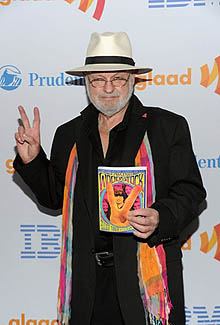 Elliot Tiber (Author - 'Palm Trees On The Hudson')
Elliot Tiber (Author - 'Palm Trees On The Hudson')
'Twas Not My Lips You Kissed But My Soul: The Elliot Tiber Story'
Nobody ever mistakes Elliot Tiber for someone who is shy, quiet, and reserved - and yet, for several years before he stood up to the plate and made the phone call that saved the 1969 Woodstock Festival from cancellation, he was just that.
Only through the double-whammy of the Stonewall Riots in July 1969, followed within weeks by his crucial role in helping the Woodstock concert find a home on the nearby hallowed ground of neighbor Max Yasgur's farm, did Tiber finally find the strength to come out of the closet to his old-world Jewish parents. "It was basically the biggest coming-out party in world history," declares Tiber, "with nearly a million new friends along for the ride."
Known throughout the world now as "the gay man who saved Woodstock" (ever since director Ang Lee made an acclaimed feature film based on his bestselling memoir TAKING WOODSTOCK), Elliot Tiber has been a professional creative writer for over 35 years. He has written and produced award-winning plays, scripts, and musical comedies for theater, television, and films around the world.
Mr. Tiber was dramaturge for the National Theater of Belgium. As a professor of comedy writing and performance, he has taught at The New School and Hunter College (CUNY) in New York City; he had previously earned a B.F.A. from the latter.
As a humorist, Mr. Tiber has appeared on CNN, NBC, CBS, CNBC, and 20/20, as well as on television shows in France, England, Tokyo, Moscow, Berlin, and Belgium (where he starred in the popular RTB-TV comedy series Sketch-Up) . He has also performed his one-man stand-up show, Woodstock Daddy, for clubs, theaters, and television.
In addition to TAKING WOODSTOCK: A TRUE STORY OF A RIOT, A CONCERT, AND A LIFE, Tiber has now also written a new book called PALM TREES ON THE HUDSON: A TRUE STORY OF THE MOB, JUDY GLARLAND, AND INTERIOR DECORATING that has been published to great critical acclaim and is rapidly becoming one of the more interesting new memoirs of the season.
Mr. Tiber was recently named an Honorary Board Member of The Gay American Heroes Foundation (GAHF), has been recognized by The New York Times as a “gay-rights pioneer,” and remains proud of his role in the 1969 Stonewall Riots.
Now in the process of finding sponsorship for his long-hoped-for Gaystock Music & Arts Festival (something he has been trying to put together now for more than 10 years), I was lucky enough to sit down with Elliot Tiber. Discussing all manner of subjects, such as his Woodstock memories, his new book, and, of course, penguins, I first asked Elliot at what point had Elliot Teichberg become Elliot Tiber? "I was always aware of the anti-Semitism that still ran rampant in the US during the 1950s. Around that time, I was dreaming of getting my first bona fide job as an artist with an art agency. It was evident to me, though, that I was not going to get that job with the Jewish name of 'Teichberg'—it just wasn’t going to happen."
"So I found a lawyer and I changed my last name legally to 'Tiber.' In those days, The New York Times had a theater column called 'Along the Tiber' so I thought that had a nice ring to it. To minimize the pain that my parents were sure to have with the name change, I simply told them that 'Tiber' was my way of simply shortening 'Teichberg.' I was eighteen years old at the time—the legal age for a name change."
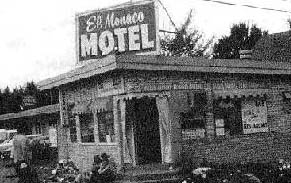
Growing up, what are your memories of working with/for your family at the El Monaco motel? (Before the whole Woodstock thing.) "From around 1959 to 1969, I worked weekdays as a successful artist and interior decorator in New York City. On weekends, I would drive up to White Lake (about two hours’ drive away from Manhattan) to help my clueless folks build and run the El Monaco Motel."
"Other than just trying to help the motel stay out of bankruptsy season after season, my main interest was the huge barn we had on the property. I tried to transform it into a theater where I might produce plays and, more importantly, perform my own comedy and humor before lots of people. In those days, an audience of ten would’ve been a lot of people," he laughs.
"I hated going up there, though. There was no business. The motel was a total flop. Foolishly, I found myself dumping most of my income from the Manhattan art and design jobs back into the El Monaco. It might have been more bearable if I actually had some love from my parents. My dad was henpecked, a miserable guy who just shuffled along, working day and night to please my mother."
"My mother was horrific. She was relentless in her desperation for money. She never had one kind word to say either to my dad or to me. In those days, my sister Goldie kept telling me that I was a fool to waste my time and money on the festering heap that was the El Monaco. She warned me that no matter what I said or did, Momma would never show me any affection because she had no idea what love was. And for the most part, she was right. I finally found a small place of comfort with my father before he died, but my mother and I were always at odds with each other. Such is life."
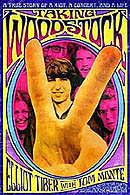
Indeed, in your book TAKING WOODSTOCK: A TRUE STORY OF A RIOT, A CONCERT, AND A LIFE, it claims you had a part in bringing the Woodstock Festival to Bethel, NY back in the day. For those who have not yet read the book or seen the subsequent movie, what part did you play in that momentous event? "Back in July 1969, the Woodstock Music & Arts Festival had suddenly lost its permit in the nearby town of Wallkill. For the previous ten years as the Chamber of Commerce president in the town of Bethel, I was in a position to issue myself a music and arts festival permit and I held my own shows on the motel grounds."
"They were, of course, total disasters like everything else in Bethel. I read that the Woodstock Ventures people had lost their permit over in Wallkill. So I called up and spoke with Mike Lang, the producer of Woodstock. I told him that I had a festival permit and fifteen acres of land that they could use for their festival. Had it not been for me and my permit, there might never have been a Woodstock Festival in 1969. Simple as that."
In reflection, and having now seen the movie yourself, how accurate is it to your memories, and to your book? "[Director] Ang Lee created a brilliant, sensitive, touching and humorous adaptation of my book. He followed the story and events very accurately. James Schamus, who wrote the screenplay and who also runs Focus Features, followed all the period details of my story beautifully. And he made it clear that it was a 'gay' man who had saved Woodstock."
Is there one section of the film that you wish you could change, perhaps? If so, for what reason? "I think I would have preferred a young Zero Mostel or Gene Wilder to have played me. Demetri Martin had no previous acting experience before being signed to play the part, and I felt his performance did not convey the zest and wild humor that has always been a part of me. I had asked that I be played by Brad Pitt. But that would have been tough on Brad, because I’m so much better looking," he laughs.
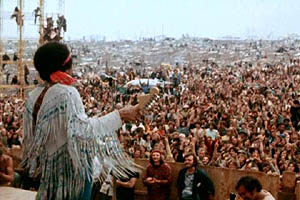
Did you actually attend Woodstock back then? And, if so, what was your own personal favorite moment of the collective performances? "Since the El Monaco was the headquarters for the festival, and since we had something like 15,000 kids or more on our premises—many of whom were caught up in bad acid trips or had sustained foot injuries from walking on broken glass—it was impossible for me to leave my older parents and the improvised 'hippie triage' that we had going on at our place in order to see the concert. I never made it to Woodstock, ironically."
"I was able to hear Woodstock from across the lake that stood between our place and the concert site over at Max Yasgur’s farm. The sounds of the concert travelled right over the lake and on to our grounds. Hearing Richie Havens sing his song 'Freedom' at the beginning of the three days was an amazing moment for me. Later that weekend, I was able very briefly to get over to the farm property just so I could see—from a distance—the gathering of nearly one million people all in one spot. I looked out and saw a literal sea of humanity—it was incredible."
As one of those responsible for Woodstock '69, did you have to stay behind and clean up the fields at Yasgur's Farm?! "No, I had enough to do just looking after things at the El Monaco. There were, however, thousands of volunteer festival kids who stayed behind for about two weeks to clean everything up. By the end of the three-day music festival, my parents and I all but totally passed out after nearly four weeks of running the El Monaco on a 24/7 basis. We were exhausted!"
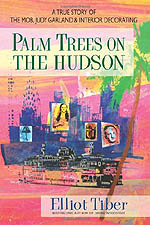
Your latest book, PALM TREES ON THE HUDSON: A TRUE STORY OF THE MOB, JUDY GLARLAND, AND INTERIOR DECORATING, is not only a prequel to TAKING WOODSTOCK: A TRUE STORY OF A RIOT, A CONCERT, AND A LIFE, but one monkey of a title — all yours in choice? "Anthony Pomes [the marketing director at my publisher Square One] came up with the title. My working title had been My Night With Judy Garland, but the publisher felt there was so much more to the story. As it turns out, he was right. I feel that the title is very provocative and it seems to seduce many would-be readers into picking up a copy of the book."
Please tell us more about this book and what it reveals along the way. "Palm Trees on the Hudson tells my life story from early childhood straight through to college, career, and the unexpected thrill of meeting my idol, Judy Garland. My maternal grandfather back in Mother Russia had been a Rabbi. Hence, my mother had dreams that I would become a Rabbi as well. She forced me to go to the Yeshiva school with that in mind—I didn’t last there long, though. When I was about eight years old, my mother took me to Tuesday night movies in our Brooklyn neighborhood—they used to give away free dishes on Tuesday nights back then, so that’s why we went."
"One night, they played The Wizard of Oz and that movie completely changed my life. My family’s home had no love in it, really. So when I saw Judy surrounded with family and love in her own special 'home,' I identified with her and yearned for that same place of love and acceptance. I followed her career over the years and into my adulthood. When I was living in New York City, I was able to see her perform live concerts at both The Palace Theatre and Carnegie Hall."
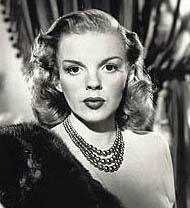
"Later, it turned out that Ms. Garland was a guest on a Hudson River cruise boat at a birthday party that I had been hired to plan and decorate (a party for a member of the Mob, though I was totally unaware of this when I was first hired to do the party). Due to an unexpected fight on the boat that night, I actually had the once-in-a-lifetime moment to talk and to spend some private time with Judy. And here again, this time in person, she influenced the rest of my life."
Do you have a juicy, personal story of a mega star meeting from back in the day that you can share with us? "Judy was an enormous talent, and I all but fell in love with her when I was just a boy. Even as a gay man, the time I spent with her was incredibly romantic, and I all but swooned in her presence. Suffice to say, I probably would have asked her to marry me if I had only a few more minutes with her. Alas, it was not to be—but I will always remember how wonderful my time with Judy Garland was, and I write about it very specifically in the book."
"She did, however, whisper something in my ear that I have never told anyone else—something that I have not written, nor will ever write or say. Sorry, but that will always remain my little secret. In the meantime, though, let me take this space to remind you and your readers that Truman Capote once went down on me! Now you’ve got your juicy gossip item!," he laughs.
Lastly, and throwing you a journalistic curve ball, Exclusive Magazine loves penguins ... do you, perhaps? "I often used to watch the penguins in the Central Park Zoo. I tried to have conversations with them, hoping to gain insight into their culture. But alas, they were very secretive. I did, however, thrown popcorn into their pool, which they clearly enjoyed. If I may paraphrase Will Rogers, I never met a penguin I didn’t like . . .!"
Interviewed by: Russell A. Trunk
Main Photo Credit: Payam Rahimian
www.elliottiber.com
www.palmtreesonthehudson.com
'Palm Trees On The Hudson' Book Purchase Page
'Taking Woodstock' Book Purchase Page
If you would like to win a SIGNED copy of either 'TAKING WOODSTOCK' or 'PALM TREES ON THE HUDSON', just answer this easy question about the author, Elliot Tiber: He taught creative writing at New School University, fine art at Hunter College, and art design history at which-named Institute?!
Send us your answers and if you're correct you'll be in the running to win one (our choice) of these SIGNED books! Just send us an e:mail here before June 1st with your answer and the subject title CONTEST: ELLIOT TIBER SIGNED BOOKs to: exclusivemagazine@flash.net
Back To Archives

